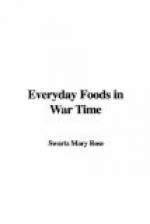A change is rapidly coming over our food habits. The price of butter has been soaring beyond our reach, and the market for “butterine,” “nut margarine,” “oleomargarine,” or whatever the substitute table fat may be called, has expanded tremendously. It is excellent household economy to buy milk and a butter substitute rather than cream or butter. In these substitutes refined vegetable oils such as cottonseed, cocoanut, and peanut, and oils derived from beef or lard are so combined or treated as to produce the desired hardness, and churned with milk or milk and butter to improve texture and flavor. Lard substitutes are similarly made from one or more of these fats, but are harder in texture and no attempt is made to give them a butter flavor by churning with milk. All the fats used are wholesome and efficient sources of energy for the human machine.
In the absence of butter some other form of fat is desirable in the diet, because fat is so concentrated a food. There is a limit to the capacity of the human stomach to hold food. People who live on a diet largely of rice, which has almost no fat in its make-up, develop characteristically distended abdomens, because they have to eat such a great quantity of food to get fuel enough for their day’s work. When people are for any reason put on a milk diet for a considerable time it is customary to put something into the milk to make it more concentrated, for otherwise they would drink and drink and then hardly get fuel enough. To give a concrete illustration—a man’s energy requirement for a day may be met by from four to five quarts of milk (unless he is doing very heavy manual labor), but it would be much more practical to substitute a loaf of bread, which is comparatively dry, for one quart of milk, and three ounces of fat (six tablespoonfuls) for another quart of milk, making the total volume but little over half what it would be if four quarts of milk were taken. For people who are engaged in hard physical toil, fat is exceedingly important for this purpose of gaining in concentration. “Fat is fuel for fighters,” and it is perfectly reasonable to ask those who are not doing much heavy labor to eat other kinds of food and save fat for those who simply have to have it to do their work well. In the ordinary mixed diet one can easily dispense with an ounce of fat (two tablespoonfuls). Each tablespoonful is equalled in energy by an apple, or a banana, a large egg, two half-inch slices of bread about three inches square, four dates, four prunes—and it is no great strain on one’s capacity for food to substitute such items for the fat.




